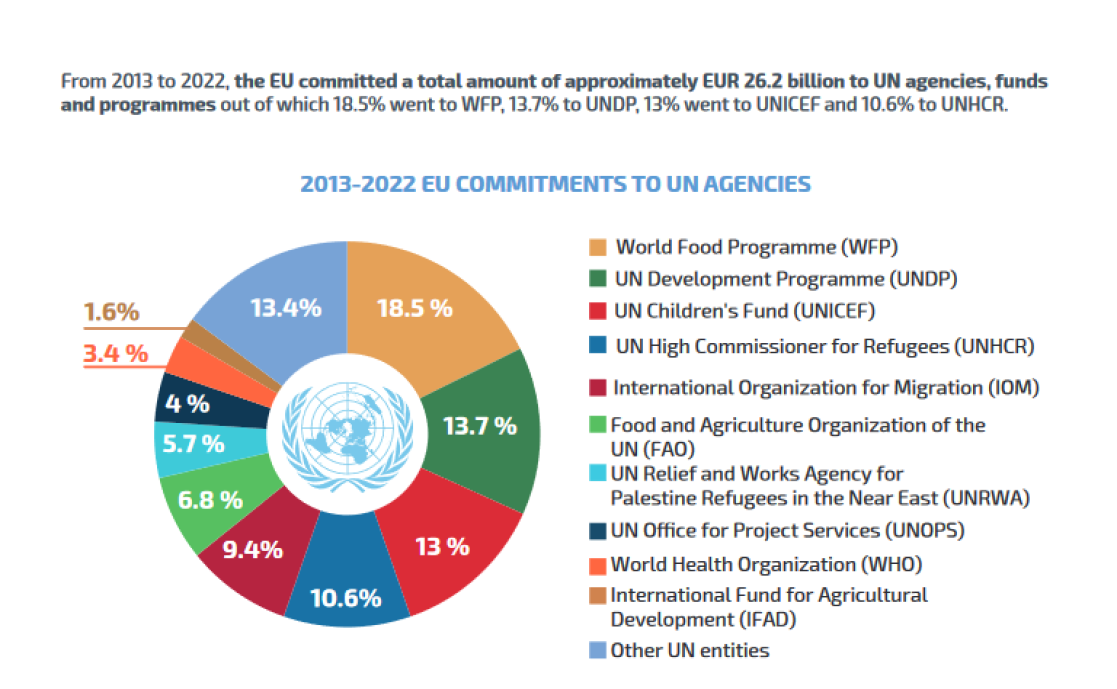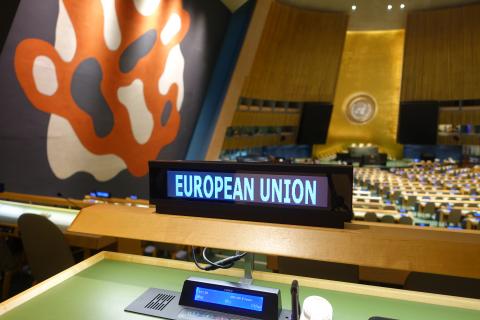RELATIONS WITH THE EU
The European Union and the United Nations
The EU is a staunch supporter of the UN. Cooperation between the EU and the UN system, including the UN Secretariat and the various UN Agencies, Funds and Programmes, spans all policy areas.
UN General Assembly
The UN General Assembly (UNGA) is comprised of all 193 Members of the United Nations and its work is carried out by six Main Committees and subsidiary organs
The General Assembly is the UN’s main deliberative, policymaking and representative organ.
Since 2011, the EU is an observer member with enhanced status at the UN General Assembly. This allows the EU to present common positions, make interventions, present proposals and participate in the general debate each September.
The added value of the EU is to coordinate among its 27 Member States to present a unified position. The EU coordinates its voting within the UN General Assembly’s six main committees, as well as other bodies and agencies such as the Economic and Social Council.
UN Security Council
The Security Council has primary responsibility for the maintenance of international peace and security. It has 15 Members, and each Member has one vote
Article 34 of the Lisbon Treaty stipulates that EU members at the UN Security Council must act in concert and foster the interests of the EU. The strong presence of EU Member States at the UN Security Council and an effective coordination among them as well as with other partners contributes to the promotion of EU interests in a cooperative way.
In January 2024, Slovenia joined Malta for a two-year term as non-permanent members. France is the only EU Member State with a permanent seat on the Security Council.
Supporting the UN
The EU and its Member States are the largest financial donors to the UN system
The EU and its Member States are collectively the single largest financial contributor to the UN system. Together, EU and its Member States provide almost one quarter of all financial contributions to the UN’s funds and programmes, whilst EU Member States also provide almost one third of the UN’s regular budget. Together EU Member States contribute nearly one quarter of the the UN Peacekeeping budget.
Aligned with the UN’s 2030 Agenda and its Sustainable Development Goals, the EU and its Member States are the leading development donors in the world, providing €92.8 billion in development assistance in 2022, which accounts for 43% of global assistance. Much of this funding is channelled through UN agencies.
The EU and its Member States are the largest donors to the World Health Organisation (WHO). In 2019, the EU institutions alone provided €146 million to the WHO. The EU and its Member States have contributed almost €500 million to the WHO for its COVID-19 appeal in support of countries to prepare and respond to coronavirus outbreaks.
Together, the EU and the UN work to eradicate hunger around the world. The EU and its Member States collectively fund 40% of the World Food Programme budget.

European Union
EU priorities at the UN General Assembly
Every year, the Council of the EU adopts EU priorities for the UN and the UN General Assembly, taking into account the UN's agenda and global issues. These priorities guide the EU's work for the year to come.
The Council adopted the EU priorities for the UN and the 79th session of the UNGA (September 2024 – September 2025) in June 2024.
The conclusions renew the EU’s determination to promote multilateral solutions based on the UN Charter, and back the UN Secretary General’s drive for 'peace in all its dimensions' and call for international cooperation to that end.
In the context of the grave, triple planetary crisis of climate change, biodiversity loss and pollution, which poses a global and existential threat and aggravates existing security concerns, the EU is committed to working with partners to accelerate a global, just and inclusive green transition. The EU is also determined to accelerate efforts to deliver the 2030 Agenda and achieve the Sustainable Development Goals, and looks forward to the Summit of the Future as a critical milestone for the multilateral system.
The EU will continue working on strengthening respect, protection, and fulfilment of all human rights and to call on all States to fully engage with the UN human rights system.
EU action at the UN in the coming year will be guided by the following overarching priorities:
I. Recommit to the foundations of a rules-based international order
II. Support international peace and security
III. Advance sustainable development and financing for development
IV. Address the triple planetary crisis
V. Foster trust through a more effective multilateral system
Furthermore, the EU will advocate for the meaningful participation of an independent, rights-based, diverse civil society in multilateral processes, including but not limited to human rights fora, peace mediation and decision-making process.
The EU at the UN Summit of the Future
The 2024 UN Summit of the Future will be a critical milestone for the multilateral system, and the EU is committed to engaging constructively on an ambitious Pact for the Future.
Since the start, the EU has engaged constructively in the process, listening to the positions of all, and is deeply committed towards building bridges in order to achieve an ambitious and action-oriented outcome Pact for the Future.
At the Summit of the Future (22-23 September 2024), world leaders will adopt the “Pact for the Future”, comprised of five chapters:
- Sustainable development and financing for development;
- International peace and security;
- Science, technology and innovation and digital cooperation;
- Youth and future generations;
- Transforming global governance.
It will also include two annexes: the Global Digital Compact and the Declaration on Future Generations, which need to be agreed in parallel negotiating processes.
The Permanent Representatives of Germany and Namibia to the UN, as co-facilitators of the Pact for the Future, are leading the negotiations that are expected to run until July. The UN Civil Society Conference 2024 (Nairobi, 9-10 May), which is supported by the EU, will provide preliminary discussions and data ahead of the Summit.
Among the questions that the Summit should address are:
- How can the SDGs implementation be accelerated?
- How can the international financial system be shaped more fairly?
- How can the collective security system be adapted to preserve or restore peace now and in the future?
- How can we shape the digital space in a positive way for humankind, preserving human rights and enabling the attainment of the SDGs?
- How can young people be better integrated into global decision-making processes?
- How can the international community safeguard the interests of all people who will come after us?
- How can the United Nations respond in a more structured and coordinated way to significant global shocks and crises?
- How can metrics underpinning political decision-making be better adapted to the complex needs of humans and of the planet?
- How can the United Nations reform internally in order to have a better impact in the world?
- How can space be utilised for the benefit of all states and risks reduced?

